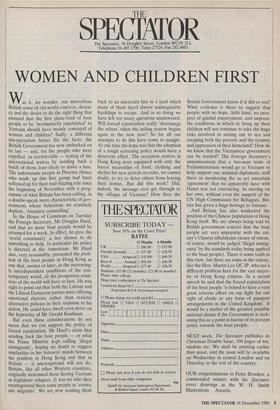SPECTAT THE OR
The Spectator, 56 Doughty Street, London WCIN 2LL Telephone 01-405 1706; Telex 27124; Fax 242 0603
WOMEN AND CHILDREN FIRST
Was it, we wonder, our marvellous British sense of old-world courtesy, decen- cy and the desire to do the right thing that ensured that the first plane-load of boat people to be 'involuntarily repatriated' to Vietnam should have mainly consisted of women and children? Sadly, a different interpretation better fits the facts: the British Government has now embarked on its last — and, for the people who were expelled, an irretrievable — testing of the international waters by sending back a batch of those least likely to make a fuss. The unfortunate people in Phoenix House who made up this first group had been softened up for their trail-blazing role since the beginning of November with a prog- ramme of what Britain has been calling, in a double-speak more characteristic of gov- ernments whose behaviour we routinely deplore, 'intensive counselling'.
In the House of Commons on Tuesday the Foreign Secretary, Mr Douglas Hurd, said that no more boat people would be returned for a week. In effect, he gave the `world community' a last chance to do something to help. In particular his policy is directed at the Americans. Mr Hurd also, very reasonably, presented the prob- lem of the boat people in Hong Kong as one that, sooner or later, in the increasing- ly interdependent conditions of the con- temporary world, all the prosperous coun- tries of the world will have to face. He was right to point out that both the Labour and the Liberal Democrat parties were offering emotional rhetoric rather than realistic alternative policies in their response to his action. He could have dwelt even more on the hypocrisy of Mr Gerald Kaufman.
But even these considerations do not mean that we can support the policy of forced, repatriation. Mr Hurd's claim that sending back the boat people — or what the Prime Minister kept calling 'illegal immigrants', hoping no doubt to suggest similaritieS in her listeners' minds between the position in Hong Kong and that in Britain — is unexceptional will not do. Britain, like all other Western countries, originally welcomed those fleeing Vietnam as legitimate refugees. It was we who then recategorised these same people as 'econo- mic migrants'. We are now sending them back to an uncertain fate in a land which many of them faced almost unimaginable hardships to escape. And in so doing we have left too many questions unanswered. Will forced repatriation really 'discourage the others' when the sailing season begins again in the new year? So far all our attempts to do this have come to naught. At one time the hope was that the adoption of a tough screening policy would have a deterrent effect. The reception centres in Hong Kong were equipped with only the barest necessities of food, clothing and shelter for new arrivals in order, we cannot doubt, to try to deter others from leaving their homes. But did this work? Did, indeed, the message ever get through to he villages of Vietnam? How does the British Government know if it did or not? What evidence is there to suggest that people with no hope, little food, no pros- pect of gainful employment, and impossi- ble conditions in which to bring up their children will not continue to take the huge risks involved in setting out to sea and escaping both the poverty and the tyranny and oppression of their homeland? How do we know that the Vietnamese government can be trusted? The Foreign Secretary's announcement that a two-man team of Parliamentarians would go to Vietnam to help support our minimal diplomatic staff there in monitoring the as yet uncertain `agreement' that we apparently have with Hanoi was not convincing. In moving on her own, without even the support of the UN High Commission for Refugees, Bri- tain has given a huge hostage to fortune.
And Britain has also weakened the position of the Chinese population of Hong Kong itself. We are always being told by British government sources that the boat people are very unpopular with the col- ony's Chinese inhabitants (many of whom, of course, would be judged 'illegal immig- rants' by the standards today being applied to the boat people). There is some truth in this view, but there are some in the colony, like the Hon. Martin Lee OC JP, who see a different problem here for the vast major- ity of Hong Kong citizens. In a recent speech he said that the forced repatriation of the boat people 'is bound to have a very great adverse effect on our fight for our right of abode or any form of passport arrangements in the United Kingdom'. It would be a matter of the greatest possible national shame if the Government is reck- oning this as a point in favour of its present policy towards the boat people.
NEXT week, The Spectator publishes its Christmas Double Issue, 104 pages of wit, wisdom etc. We shall be printing earlier than usual, and the issue will be available on Wednesday in central London and on Thursday in the rest of the country.
OUR congratulations to Peter Brookes, a commended winner with his Spectator cover drawings in the W. H. Smith Illustrations Awards.


















































 Previous page
Previous page